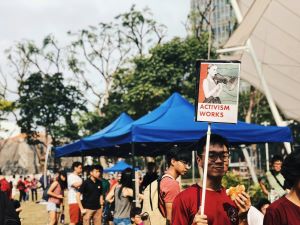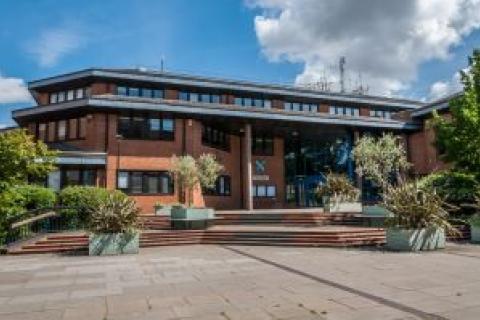Governance and Leadership - Our Actions
To succeed in our carbon reduction and sustainability goals, structures and processes need to be in place to ensure that all areas of the Council reflect our commitment to achieving net zero 2030. It is important that the commitment is embedded into the Council culture and that our staff and elected members have all the tools available to deliver the Action Plan.
As a community leader, it is also important that we speak up about the environment and the changes that are needed
to promote a healthy and sustainable District. We are in a prominent position to raise awareness of environmental
issues and encourage communities to take action and be part of the solution.
We will also use our connections to escalate concerns or known barriers to a national level to seek policies and funding required to meet our ambitions.
We have committed to a range of objectives and actions through our Sustainability and Climate Crisis Strategy 2024-2027. This page sets out the progress we have made so far in relation to each objective. It will be updated periodically.
 We will reflect the strategy in all areas of Council decision making.
We will reflect the strategy in all areas of Council decision making.
- GL1 Ensure all Council plans, strategies and decisions articulate how they will support the corporate emissions reduction commitment, help to deliver the Strategy, support biodiversity and promote climate resilience.
What we will do
- Ensure that all emerging and refreshed strategies take account of, reference and support the Sustainability and Climate Crisis Strategy and actions.
- Develop a more robust process for assessing the sustainability impact of decisions and capital-funded projects. This can include conducting Carbon Impact Assessments and calculating Scope 3 emissions where feasible to maximise the climate benefit of Council investments and limit new sources of corporate emissions.
- Assess all relevant potential climate risks and impacts on Council services to produce an up-to-date Climate Risk Register. Begin identifying strategies and actions as part of this work to ensure responsibility and next steps are taken towards ensuring climate resiliency and risk mitigation.
- Finalise and implement the sustainability policies for all Council events to reduce environmental impacts.
Progress so far
- Sustainability Impact Assessment process is in place for assessing potential impacts of new policies, projects and large purchases.
Climate Risk Register has been produced and is reviewed and updated every year. The risks have been incorporated into Strategic and Directorate Service Plans to ensure cross-Council adoption.
Addressing the climate challenge is a key priority in the current Council Plan and will also be in the 2025-2030 Council Plan.
Climate Change forms an important part of our policy development including for example the Air Quality Action Plan, Tree Strategy, Economic Development Strategy and Parking Review. It plays a central part of the Local Plan.
 We will ensure that all service areas take account of the strategy and make the most of every opportunity to help meet our commitment.
We will ensure that all service areas take account of the strategy and make the most of every opportunity to help meet our commitment.
- GL2 Embed positive behaviour change to reduce Council greenhouse gas emissions in all service areas and assets.
What we will do:
- Deliver an appropriate level of climate literacy style training for all decision-makers, managers, elected members, staff in key service areas and committee chairs.
- Provide an appropriate level of climate literacy style training as part of the induction process for all new staff and councillors.
- Encourage staff to set appropriate performance goals/objectives relating to their contribution to the delivery of the Sustainability and Climate Crisis Strategy. Evidence of how this has been achieved can be assessed during the annual review process by managers.
- Make the Council's commitment to deliver the Sustainability and Climate Crisis Strategy clear throughout the recruitment process.
- Make it an ongoing business requirement that each service area regularly reviews and seeks to identify ways in which Council services and processes can be more efficient and reduce emissions e.g. reducing waste, paperless working and reducing work mileage.
- Include progress, opportunities and expectations to deliver the Sustainability and Climate Crisis Strategy in staff briefings to ensure it is recognised as a corporate objective.
- Work with leaders to deliver ongoing engagement and awareness raising to staff, contractors and service providers on sustainability issues and solutions through the staff portal, weekly Team Brief, staff emails and direct training. Leaders to lead by example, regularly demonstrating their own engagement and relevant actions.
Progress so far:
- All Council staff undertake annual sustainability training via eLearning. In the coming year a mandatory Climate Change eLearning module will be provided to all staff.
- Training has been provided to some senior managers in climate science, climate change mitigation and adaptation.
- Councillors have access to video recorded climate and sustainability training.
- New initiatives and programs are promoted to staff via our main internal communications channels.
Internal Climate Champion group meet throughout the year to identify areas for improvement within their areas of work. - Council staff complete a Sustainability Impact Assessment before starting new projects or making large purchases so that any impacts can be assessed and mitigated at an early stage. 93 have been completed so far.
- Council's Productivity Plan outlines the actions we are taken to ensure efficiency:
- Planning staff attended a Planning for Climate Change training run by Herts Growth Board, Jan 2025.
 We will expect the organisations who work with us to help us to deliver the strategy.
We will expect the organisations who work with us to help us to deliver the strategy.
- GL3 Ensure our commitment to reduce corporate emissions to net zero by 2030 is reflected in the Council’s procurement process.
What we will do:
- Monitor which contracts are due for renewal over the forthcoming year to assess current sustainability impacts and methods of making improvements at the next contract upgrade.
- Require all proposed contractors to set out their own sustainability measures and conditions and how they intend to carry out works on behalf of the Council in a way that contributes to the delivery of the Sustainability and Climate Crisis Strategy. This should be taken into account when awarding contracts.
- Require Council contractors over a certain size to regularly report their greenhouse gas emissions and the measures that have been, and will be taken to reduce these emissions and promote sustainable work practices. This information should be used to challenge contractors to make ongoing emissions reductions.
- Develop standard green clauses to ensure new tenants and leaseholders have Net Zero requirements in their leasehold agreements where possible, including annual reporting on energy consumption and greenhouse gas emissions.
Progress so far:
- Our largest contractors are required to submit their energy and fuel data each year for inclusion in the Council's annual greenhouse gas emissions analysis.
- Sustainable Procurement Policy outlines our core sustainability requirements around contracts and purchases.
- New suppliers are required to fill in a sustainability questionnaire.
 Measure our progress to meet our commitment and publish reports on our website.
Measure our progress to meet our commitment and publish reports on our website.
- GL4 Manage, monitor and report progress on meeting our commitment to reduce corporate emissions to net zero by 2030.
What we will do:
- Report progress on actions to the senior management team and members in full annually, with an informal update on the progress of projects selected by the sustainability officer quarterly.
- Explore the potential to capture additional elements within the corporate emissions analysis and publish the Council and District greenhouse gas reports annually on the Council website.
- Require the officers responsible for delivering actions to update the Sustainability Officer on progress via the action plan tracker quarterly. Updates on specific projects should also be given to the relevant manager and/or committee as appropriate.
- Review the financing mechanisms available to fund the actions in this plan and ensure they match or a plan is developed to identify additional sources. This should include a clear policy of financing Invest to Save proposals based on specific emission and cost-saving criteria.
Our progress so far:
- The Council's annual greenhouse gas emissions are calculated and reported annually and are published on our website here.
- Officers are required to report progress quarterly on their Sustainability and Climate Crisis Strategy actions.
Working Groups have been established to bring individuals together to collaborate on achieving the desired objectives in the action plan.
Progress reports are reviewed biannually by Senior Leadership Team.
An Invest to Save capital budget (£1m) is available to fund actions in this plan subject to generating savings/efficiencies that pay back the borrowing requirement over 5 years. - Officers are required to report progress quarterly on their Sustainability and Climate Crisis Strategy actions.
- An Invest to Save capital budget (£1m) is available to fund actions in this plan subject to generating savings/efficiencies that pay back the borrowing requirement over 5 years.
 Proactively work to promote the strategy within the St Albans community.
Proactively work to promote the strategy within the St Albans community.
- GL5 Communicate effectively with the local community to raise awareness, facilitate behaviour change, reduce District greenhouse gas emissions, improve the resilience of the District to climate change and support biodiversity.
What we will do:
- Deliver strong and consistent messages to the public about sustainability, the environment and climate change through the Council's publicity channels, which include the Community News publication, www.stalbans.gov.uk, MyStAlbans District account, press releases, social media, events, Sustainability News and the Building Futures website.
- Lead St Albans Greener Together by working in partnership with local groups, organisations, businesses and local citizens to develop solutions to overcome barriers to actions. This will include ensuring the delivery of the Communications and Behaviour Change Plan along with the administration of the St Albans Greener Together fund.
- Keep the Council website up to date with relevant Action Plan and greenhouse gas report progress.
Our progress so far:
- Sustainability News is sent to over 4,000 subscribers, The most recent publication was sent in April 2024.
- Council media content, Community News and social media channels regularly report on local environmental initiatives.
- The Council, in partnership with the University of Hertfordshire, won £300,000 from Innovate UK to deliver an initiative called St Albans Greener Together which focuses on community engagement, education and delivery of local sustainability solutions. A full communications plan has been produced including a monthly schedule of topics. Stakeholders are now being invited to join take part.
In partnership with Sustainable St Albans we have provided training and engagement to 22 groups and businesses; trained nine Climate Champions who have engaged a further 192 people and delivered four pop-up events in Batchwood, Sopwell and Cunningham Wards.
 We cannot deliver the net zero 2030 commitment ourselves, therefore we will proactively work with others to make a real difference in the District.
We cannot deliver the net zero 2030 commitment ourselves, therefore we will proactively work with others to make a real difference in the District.
- GL6 Work with partners, including the County Council, to deliver, support and promote opportunities and projects for communities to mitigate and adapt to climate change, support biodiversity and promote sustainability across the District.
What we will do:
- Amplify communications related to partnership projects including those of Hertfordshire County Council and Town or Parish Councils.
- Encourage communities and businesses to develop and implement their own greenhouse gas emission reduction plans and initiatives.
- Seek to influence the Government to introduce more stringent sustainability policy in areas such as building, housing, renewable technologies, energy, water, waste and habitat protection, through responding to consultations and working with organisations such as the Local Government Association.
- Work with the St Albans Business Improvement District (St Albans BID) and other business networks, to develop and deliver city-wide environmental schemes and improvements. This might include Greening Business Support Schemes or Business sponsored renewable projects.
- Work with existing or new strategic partnerships to help promote and deliver the action plan.
- Our Economic Development work will promote sustainability and circular economy principles such as low carbon skills development and use of local products and workforce. We will network with organisations that can support businesses with emissions reduction.
Our Progress so far:
- We are actively involved in numerous partnerships and groups including Hertfordshire Climate Change and Sustainability Partnership, Strategic Partnership and two Community Rail Partnerships,
Held a Sustainable Business Conference in 2023. - We promote funding and initiatives available to businesses as they arise, such as the Low Carbon Workspaces grant, Eastern New Energy Programme, Herts IQ, Low Carbon Innovation Fund and Clean Growth Fund.
- We support the annual SustFest held by Sustainable St Albans.
- We offer our support to Parish Councils and others seeking to improve their environmental credentials and formulate their own action plans.
- We actively take part in County campaigns such as Clean Air Night and the promotion of Herts Retrofit Guide.
- We regularly respond to national consultations either individually (e.g. National Planning Policy Framework Consultation) or as part of wider regional partnerships (e.g. Regional Energy Strategic Plan).
- We work closely with Oaklands College and Herts Futures to help identity the skills we need locally for decarbonisation. Herts Futures run training and grant schemes to help unlock training opportunities for SMEs, traders and residents.
- Over £50,000 has been awarded by St Albans Greener Together to 6 local community projects focused on provision of cycle training and bicycles to children, community food waste composting, provision of community engagement via the Sustainability Festival, establishing a pilot Library of Things in St Albans town centre, a sewing repair project to encourage reuse and an e-cargo bike project.
 We will include ambitious climate change policies in the emerging Local Plan.
We will include ambitious climate change policies in the emerging Local Plan.
- GL7 Ensure the Local Plan fully addresses climate change, promotes sustainability, supports biodiversity and helps to deliver the strategy.
What we will do:
- Prepare a robust evidence base to explore potential opportunities for the Local Plan to incorporate climate change mitigation and adaptation policies including sustainable building practices, renewable energy allocations, transport, sustainable drainage, biodiversity and the natural environment.
- Ensure the Local Plan growth strategy takes account of the Sustainability and Climate Crisis Strategy.
- Encourage Neighbourhood Plans to include climate change considerations and policies.
- Use planning and regulatory powers as appropriate to ensure all new developments are built to high sustainability standards, support active and sustainable travel, promote circular economy principles, conserve and enhance the natural environment and biodiversity, promote water efficiency and reduce the risk of flooding.
Our Progress so far:
- Local Plan Draft policies agreed at Planning Policy & Climate Committee and Local Plan were submitted to the Secretary of State on 29 November 2024.




